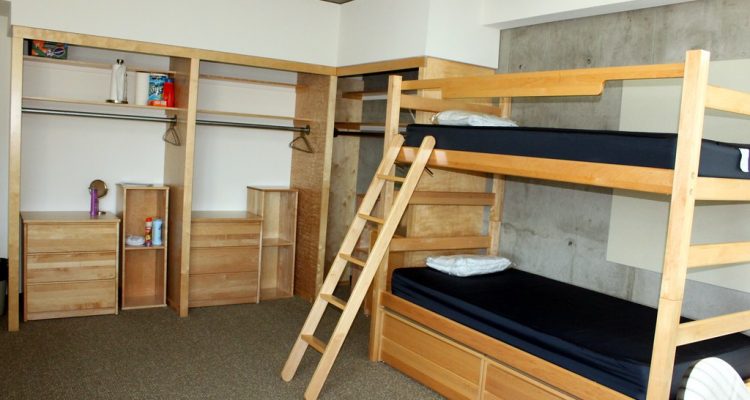Incoming students, that will be part of the Class of 2025, were notified that a small percentage of the class will be housed in a converted room assignment, or converted triple in an email sent by Associate Dean & Director of the Office of Residence Life Meredith Smith on June eighth.
The email described converted room assignments to be “a converted double room that houses two students to a triple, which will house three students.” The Office of Residence Life projects that at most, 10 percent of the class, or 150 students will be housed in 5o converted triples.
Due to the Class of 2025’s size, there will be no option for opting out of an housing assignment if student’s receive one of the converted triples.
As stated in the email: “Due to the constraints in our campus housing capacity, we will not be able to accommodate opt-out requests.”
In recognition of the inconvenience of this potential housing assignment, the Office of Residence life will offer a financial incentive for students who are assigned to a converted triple.
Students living in the converted triples will receive a $750 credit if they are in a converted triple. Residence Life hopes this “will be a one semester concern” according to Smith. However, if students are still in a triple by October 12, they will receive an additional $750 credit.
Although students may not choose to opt-out of converted triple housing, they are able to request to secure a spot in a converted triple by contacting the Office of Residence Life.
The Fairfield University Student Association hopes to provide plenty of opportunities to get students engaged outside their residence hall rooms, according to Fairfield University Student Association President Tyler Heffern ‘22, who notes that “students affected by these ‘converted triples’ may have a modified experience.”
Heffern added that FUSA appreciates the financial relief the Office of Residence Life will provide to the students placed in these triples and looks forward to working with Residence Life in determining additional ways to support these students.
“The University has voiced that this should only last for the first semester and we hope they honor this promise made to our incoming students,” Heffern said.
If and when space becomes available, the Office of Residence Life will begin a process of “de-tripling.” The email noted that “many students decline to be ‘de-tripled’” when offered.
Smith stated that there are “several factors” being monitored to play a role in opening up space availability for the de-tripling process.
“Some of the top factors include eligible students opting for commuter status, study abroad numbers, and medical or accommodation needs for each semester,” Smith said.
Though the actual housing options have broadened for the Class of 2025, the process of roommate placement has remained the same, as Smith noted that Residence Life will follow their first-year protocol that prioritizes students’ living preferences.
“Converted room assignments will be determined by the housing software system and selected randomly once students are matched based upon their housing application responses,” Smith said. “If this year’s patterns follow previous converted triple trends, our 95 percent roommate success rate will not be negatively impacted.”
The housing selection process for the Class of 2022, Class of 2023 and Class of 2024 faced their own respective hiccups. However, when asked if Smith saw this as a housing crisis at Fairfield, she noted that this will not be the first time Fairfield has utilized converted housing assignments and converted housing assignments are not unique to Fairfield.
Most recently, Fairfield made use of converted housing options in 2010-2011 and during the fall 2012 semester. Prior to that, Smith said there were also several years during the 2000s including 2006-2007 and 2008-2009.
“Converted triples are a common practice among our peer institutions throughout the Northeast who’ve experienced larger-than-anticipated class sizes,” Smith said.
Additionally, Smith noted that there will be expansions to housing for future Junior and Senior students.
“Barnyard Manor is currently on schedule,” Smith said. “We are currently in the process of converting the old health center and counseling center into additional apartment space for future junior and senior students.”
She also noted that the Office of Residence Life has been working directly with students who choose to be commuters or off-campus students this upcoming fall.
Since announcing the converted housing, Smith said “there have been concerns and requests to opt-in to a converted triple.” She also stated that some students and families have asked questions directly related to the tripling process during the first weekend of New Student Orientation.
“We recognize that issues arise for students throughout their time at the University and we plan to continue to engage in conversations with administrators as these issues arise,” Heffern said.
The FUSA Senate formed a Housing Reform Committee composed of students from all class years “who have drafted numerous proposals to discuss with administration.”
Heffern stated that “we are looking forward to working closely with the Residence Life team to review potential updates to the housing system.”
The Office of Residence Life does not foresee the converted triples affecting the University’s retention rate.
“We’re providing a wonderful residential community experience for students to make connections, learn and grow together,” Smith said.
The housing assignment process will take place in July. Students can expect their housing assignment to be emailed to them during the first week of August.
The Mirror will continue to update on this matter as more information becomes available.


Leave a Reply